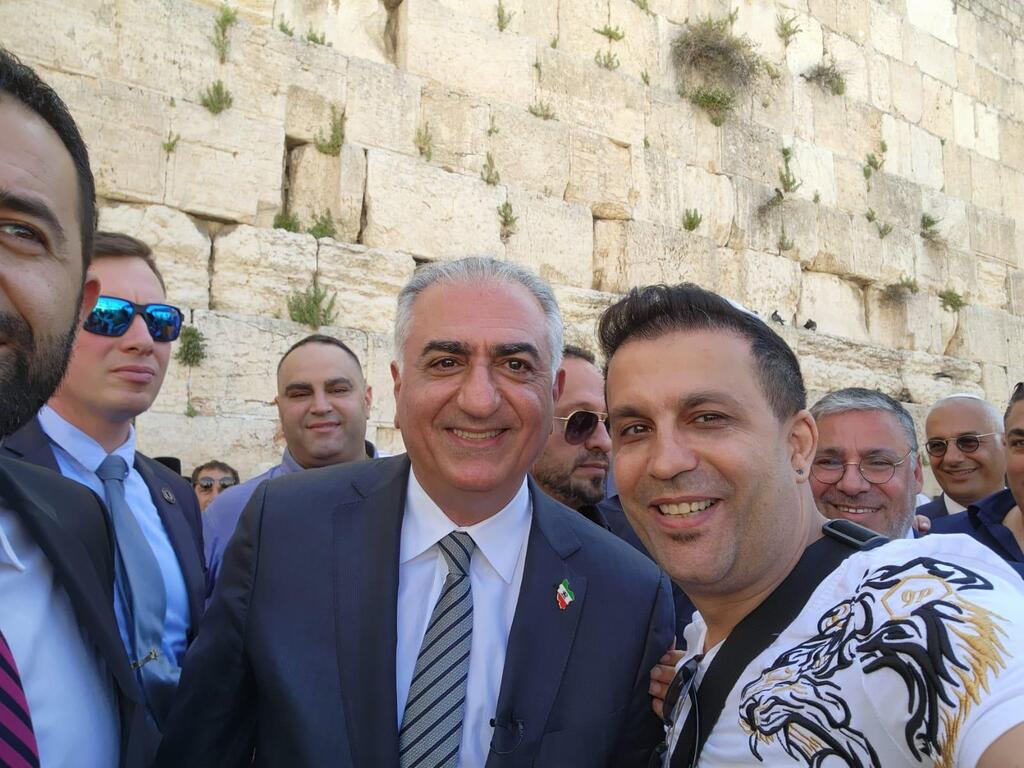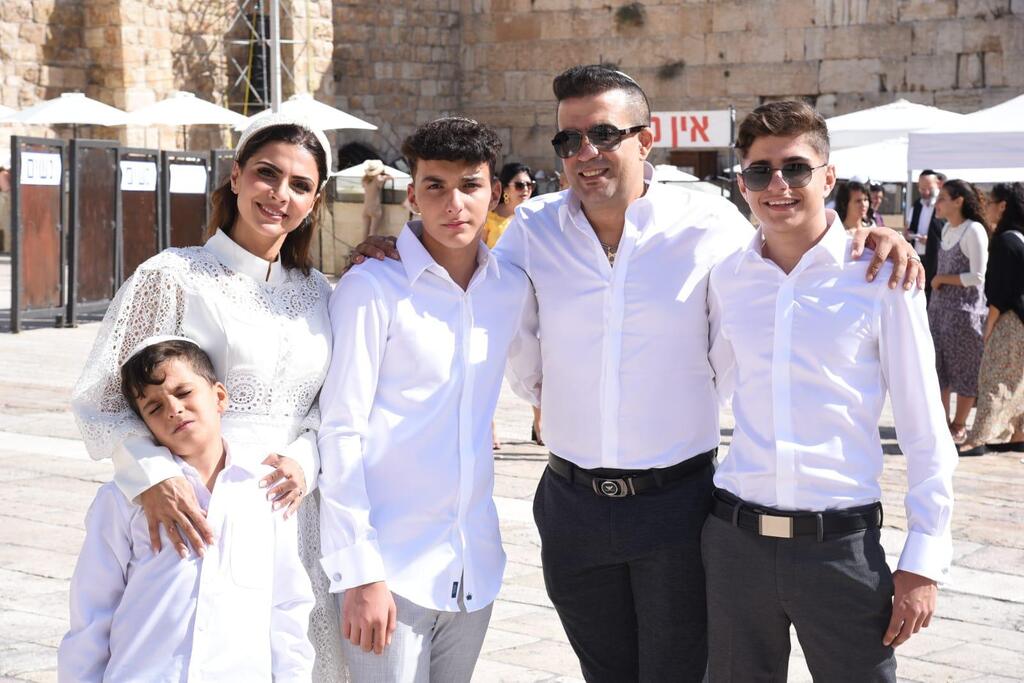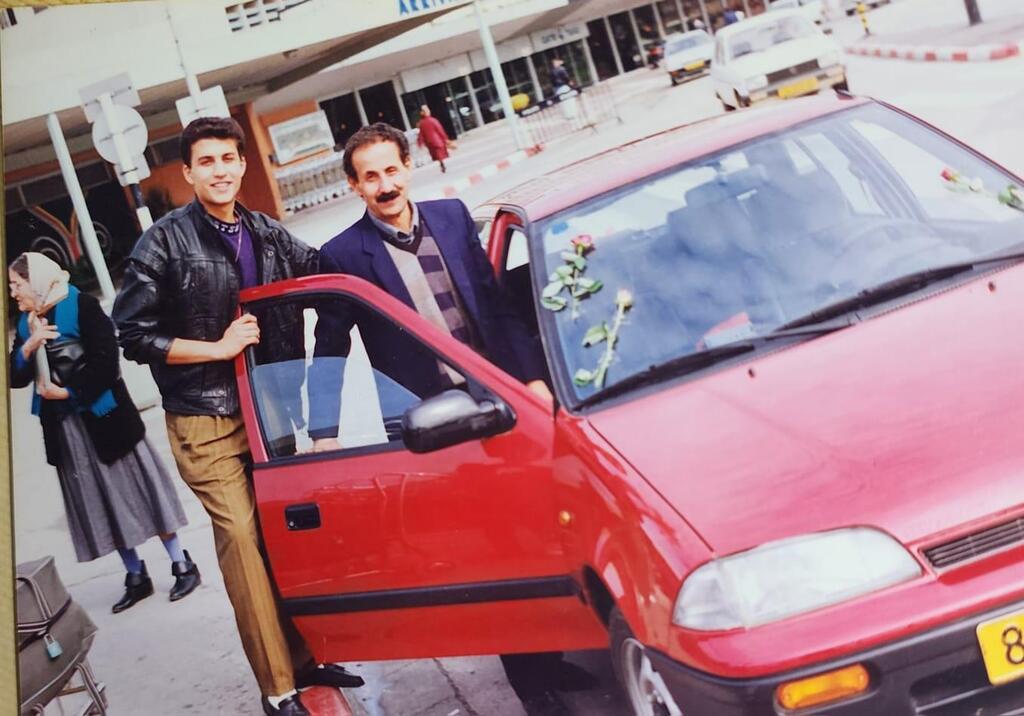Getting your Trinity Audio player ready...
Rani, 44, and Yafit, 40, Amrani live in Jerusalem with their three children Roee, 17, Ron, 13, and Ryan, 9. Rani is a DJ who plays at events and at the same time runs Radio Ran, a Persian-language radio station he started in late 2008. Yafit is a wig and hair designer and chemistry teacher.

Where are you from?
"We came from Tehran, Iran."
When?
"Rani immigrated in December 1995, 27 years ago, when he was 17 years old. Yafit made Aliyah in 2002 at 18."
What made you decide to make Aliyah?
Rani: "Zionism. As a child, I heard stories about my uncles on my father's side, who had absorbed Zionism and love for Israel from Iraqi immigrants who passed via Iran en route to Israel. They were determined to immigrate to Israel and fight for it. They made Aliyah when Israel was established and fought in the Six-Day War and Yom Kippur War; I was fascinated by their stories of Zionism and bravery. It was clear to me back then that Israel was the country I wanted to live in. All my relatives on my mother's side moved to the United States.
"My brother made Aliyah three years before me", he continues. "My father paid a smuggler to help my brother cross the border to Turkey and from there to Israel, without a passport. In October, at the end of summer break there, I managed to leave via Afghanistan and Pakistan. I was already anxious to get out because antisemitism and hatred toward Jews were intense. Until 9th grade, I attended Jewish schools, so I didn't experience antisemitism. But in Junior high and high school, which were Muslim institutes – everything changed. We were exposed to antisemitism coming from both students and faculty, and it continued even after school hours.
"We were a very Zionist household, and my father would always say, 'We will finally leave'," recalls Amrani. "It felt like we were always packed and ready to go because the idea of making Aliyah was always there. At that time, my grandmother would pay regular visits to Israel until she finally decided to stay.
"Three years later, my mother and sister followed her to Israel. Only after ensuring that we were all settled and safe did my father manage to sell our family clothes store, albeit with great difficulty and at a bargain price, before joining us in Israel.
"Back then, at Ayatollah Ruhollah Khomeini's order, it was prohibited to buy from Jewish stores, Jews could not leave Iran with property or money, and Jews were not allowed to be issued passports, especially young men before military service. Even when the Iranians loosened restrictions on obtaining passports, Jews would have to leave a hefty deposit, knowing it would never be returned. Iranians did everything in their power to prevent Jews from immigrating to Israel."
3 View gallery


Rani Amrani with the Iranian Crown Prince Reza Koresh Ali Pahlavi, son of the Shah, in Jerusalem
Yafit: "I remember myself at the age of five, saying that once I have a passport, I will immigrate to Israel, even all by myself; I said that without really knowing how hard it was to be Jewish in Iran. My mother, who was connected to Iran and its culture, was against it, and my father was in favor. When I made Aliyah, my father accompanied me to Israel and had the opportunity to visit his parents after not seeing them for 13 years as they were living in Israel."
What do you like the most about Israel?
Rani: "Jerusalem's lights and energy are like nowhere else in the world. After years of praying for L'Shana Haba'ah B'Yerushalayim (next year in Jerusalem), and after spending 45 days on the road under harsh conditions, at border crossings, being illegal without a passport, bearing only a transit document and a plane ticket I had received on the way from strangers who later turned out to be Mossad agents – landing at Ben Gurion Airport was a thrilling moment. Ever since that moment, I simply love this country and everything it has to offer."
Yafit: "I love the simplicity. As a Jew in Iran, I experienced the economic differences. Having very rich people living with poor people side by side in the same neighborhood is common in Iran. In Israel, everyone gets along with everyone, and you can be friends with everyone, regardless of your economic status; I find it charming."
What are you still having trouble getting used to?
Rani: "Despite the fact that I feel 100% Israeli, there are still Israelis who don't accept me as such and label me when hearing my last name or my Persian accent. On the other hand, it encourages me to work harder than others and prove myself. It makes me very professional at what I do."
Yafit: "There is no respect here. I see how children treat their parents, it's unbelievable. They should be taught some manners by Iranians. In Israel you work hard, cost of living is crazy, I have to work overtime, way beyond regular hours, to make a decent living. In Iran, Jewish people look out for each other. Here it bothers me that there's no love among people, between left and right, between secular and religious. In Iran, as much as our enemies wished to defeat and eliminate us, we Jews were always united and stood together as one. I also don't like the stupid and sexual TV shows designed for children."
Rani: "It is clear to me that had I stayed there my life would have been different. The standard of living in Israel is much better. I was lucky to leave Iran"
Do you find your situation in Israel better than in Iran?
Rani: "Iran is a ruined country with a poor economy, it suffers from a high cost of living, and the governing people are either irresponsible or being appointed based on their kinship to the regime. It is clear to me that had I stayed there my life would have been different. The standard of living in Israel is much better. I was lucky to leave Iran."
Yafit: "I would never go back to living in Iran; although I'm willing to go for a visit, as I miss Iran and its landscapes."
What is your favorite place in Israel?
Rani: "Jerusalem. As a child, I always dreamed of living there, and since I've been living in Jerusalem, my love for it grew stronger. It is a fun city, the center of the universe, filled with unique architecture and tourists. The weather here, and the mountain air are most similar to Tehran. There's also an advantage to living near Arabs who sell products you can't find elsewhere in Israel, which reminds me of Tehran. For example, yogurt juice, or green leafy vegetables like tarragon or pepperwort, which Persians like to eat. I can buy it in Beit Hanina or Wadi Joz in eastern Jerusalem."
Yafit: "I second that. I wouldn't replace Jerusalem with any other city in the world. I also like the Golan Heights and the north in general.
Do you have any advice for future Olim?
Rani: "They should bear in mind that each day passing by without them being here – is a day wasted. Also, to integrate properly, they should learn Hebrew. For those from Iran who hesitate, I say to you: Look at me. I've made it from scratch. I built a home, a family, a business – you can make it too. Don't be afraid."
Yafit: "This is not Iran. Don't be lazy and go to work. You get nothing for free. Also, don't be ashamed to ask for help."
"I call on Israelis to think like Jews living in the Diaspora, so they would understand and appreciate the importance of the State of Israel. I believe that bearing that in mind, we could reach common ground. We must learn our lesson from the Holocaust"
When was the first time you felt like a true Israeli?
Rani: "When I enlisted in the army. Also, when I meet Iranians, abroad, I really feel like an Israeli although I'm careful not to speak Hebrew. My radio broadcasts involve Israeli hasbarah. I run a Zionist radio station that features numerous programs and debates against the Iranian regime. In general, many Iranians love us for no reason, just because the Iranian regime doesn't like us, and therefore they are open to talk and listen. They ask serious and difficult questions, and we answer."
Yafit: "After spending half a year in an ulpan in Nahariya, I went to a kibbutz, and that's when I felt like a true Israeli."
What do you wish for Israel in the coming year?
Rani: "I wish for some peace, for unconditional love regardless of political views. I call on Israelis to think like Jews living in the Diaspora, so they would understand and appreciate the importance of the State of Israel. I believe that bearing that in mind, we could reach common ground. We must learn our lesson from the Holocaust. If Herzl had established Israel 50 years earlier, with the same strong and powerful country as it is today – the Holocaust would never have happened.
Yafit: "I wish for true unity, both among lawmakers and among ourselves. It is important to show the world that we are united and love each other. We have enough enemies out there."




